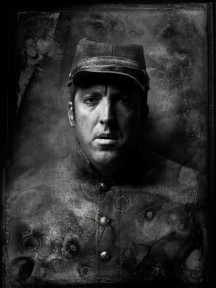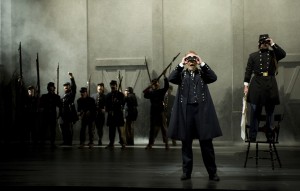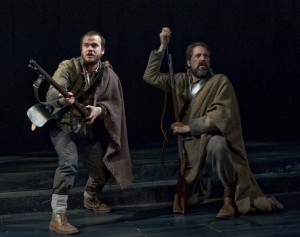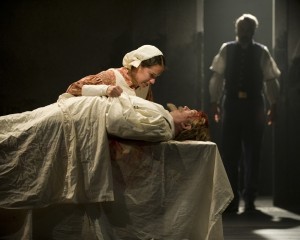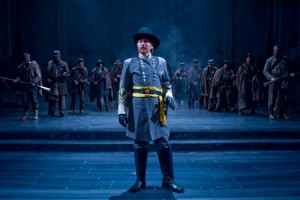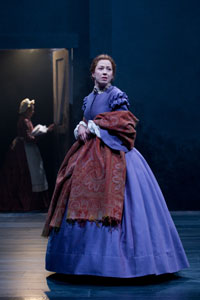THE LONG MARCH
E. L. Doctorow’s The March was a fine Civil War novel and likely would make an excellent motion picture, but as a play it has problems. The ambitious adaptation at the Steppenwolf Theatre certainly gives the book a brave try, but at 2 hours and 50 minutes the production turns out to be a pretty long sit for the audience.
The March describes the Union army’s slash-and-burn march through the Deep South in the waning months of the Civil War from late 1864 through early 1865. Led by Union general William Tecumseh Sherman, the Union forces lived off the land, destroying plantations and towns and appropriating livestock and crops while they moved through Georgia and North and South Carolina. As they plundered through the South, the Union army attracted a vast following crowd of freed black slaves and white refugees, adding to the chaos and suffering of Sherman’s ruthless campaign.
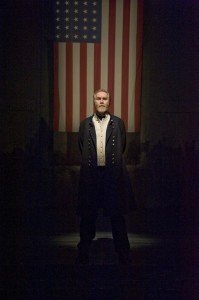 Doctorow told the story of Sherman’s march as a mosaic of incidents and characters. The novel touched on the lives of dozens of men and women – military. civilian, black and white – representing both the North and the South. Doctorow humanized the war by bringing it into the scale of individuals trying to survive in a maelstrom of overwhelming violence and social disruption.
Doctorow told the story of Sherman’s march as a mosaic of incidents and characters. The novel touched on the lives of dozens of men and women – military. civilian, black and white – representing both the North and the South. Doctorow humanized the war by bringing it into the scale of individuals trying to survive in a maelstrom of overwhelming violence and social disruption.
The novel attracted the interest of Steppenwolf director Frank Galati, an old hand at epic storytelling for the stage. His adaptation of The Grapes of Wrath and direction of Ragtime rank among the major works of the 1990’s in the American theater. It’s easy to see what drew Galati to The March, with its many vivid personalities, dramatic episodes, and powerful sense of history in the making. Galati’s adaptation follows the Doctorow novel closely, but what was gripping on the page lacks power and narrative drive on the Steppenwolf stage. The march itself of necessity happens off stage and is recounted through narration. Badly wounded soldiers are carried on and off stage to convey the realities of battle’s savagery, but mostly the audience hears about the war but doesn’t see it, which means the viewer doesn’t sufficiently feel the fear and tension and bravery and cowardice of the conflict.
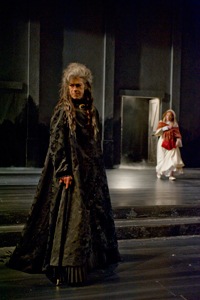 The characters crowd the stage but only a few make a real impact, notably General Sherman, a freed slave named Pearl, and a pair of petty criminals named Arly and Will who try to survive the conflict as opportunists, swinging back and forth between the two sides. These characters stimulate much the show’s best acting, from Harry Groener (Sherman), Shannon Matesky (Pearl), and Ian Barford and Stephen Louis Grush (Arly and Will).
The characters crowd the stage but only a few make a real impact, notably General Sherman, a freed slave named Pearl, and a pair of petty criminals named Arly and Will who try to survive the conflict as opportunists, swinging back and forth between the two sides. These characters stimulate much the show’s best acting, from Harry Groener (Sherman), Shannon Matesky (Pearl), and Ian Barford and Stephen Louis Grush (Arly and Will).
The adaptation relies heavily on monologues that characters speak directly to the audience. The monologues work in the novel but too often they sound arch and literary in the play. Virtually all the main characters take turns delivering verbal essays we would never expect to hear from people in their stations of life. It’s the kind of stage convention that works in a Shakespeare history play but sounds contrived in The March.
In spite of all the characters and incidents, the narrative doesn’t grab the viewer. Things happen, one after the other, without sufficient cumulative impact. Some of the incidents are striking, as when a freed slave dreams of a happy life as a farmer with the 40 acres of farmland Sherman decreed would be allotted to all freed male slaves. With the hindsight of history, the audience knows the black man’s hopes for a good life working the land would crumble in the racist years to come in the South. There are other successful bits scattered throughout the evening, some grim, some passionate, some humorous, but they don’t add up to a cohesive and engrossing dramatic experience.
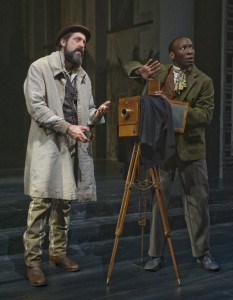 The Steppenwolf ensemble gets highest marks for quality of acting. Groener brings Sherman alive as the warrior who destroys the South with no regret during his march. Sherman is the source of the famous phrase “War is hell.” He saw his job as defeating an enemy he despised for trying to break up the union, but at the end of the play Groener’s general displays some ambiguity in his mind about the brutal costs of warfare.
The Steppenwolf ensemble gets highest marks for quality of acting. Groener brings Sherman alive as the warrior who destroys the South with no regret during his march. Sherman is the source of the famous phrase “War is hell.” He saw his job as defeating an enemy he despised for trying to break up the union, but at the end of the play Groener’s general displays some ambiguity in his mind about the brutal costs of warfare.
Matesky is superb as the teen-age Pearl, a spunky and intelligent girl who ends up about as happy as any of the main characters. As Arly, Barford dominates the play through the sheer force of his wily personality. His Arly is a rascal with his eye continually on the main chance. But Arly’s poetic and philosophical disquisitions are at odds with a scruffy character trying to survive the war by fair means or foul. There is also solid work from Grush as Will, Philip R. Smith as a Union surgeon, and Philip James Brannon as a variety of black men. Mariann Mayberry, Carrie Coon, and Martha Lavey all flourish as the chief female characters.
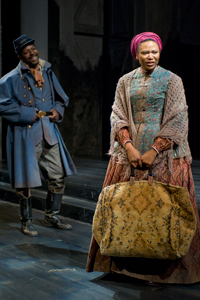 The designers do their best to create a sense of the conflict through dramatic lighting (designed by James F. Ingalls), sound (designed by Josh Schmidt), and projections (designed by Stephen Mazurek). James Schuette designed the flexible set that moves fluidly between interiors and the outdoor war zone. Virgil Johnson designed the vast wardrobe of costumes that gives the production its authentic period look.
The designers do their best to create a sense of the conflict through dramatic lighting (designed by James F. Ingalls), sound (designed by Josh Schmidt), and projections (designed by Stephen Mazurek). James Schuette designed the flexible set that moves fluidly between interiors and the outdoor war zone. Virgil Johnson designed the vast wardrobe of costumes that gives the production its authentic period look.
The action moves in short scenes, with characters coming and going from the rear of the stage and the wings, and occasionally the aisles. Galati does a masterful job of orchestrating the continuous movement, so visually there isn’t a dull moment in the show. But all the creative design work and fine acting don’t add up to a play that should be as compelling as the events it describes. The production falls into the “nice try” category, resourceful and committed but in the final reckoning it doesn’t quite come off.
The March
Steppenwolf Downstairs Theatre in Chicago
ends on June 10, 2012
for tickets, call 312 335 1650 or visit Steppenwolf
for more shows, visit Theatre in Chicago
